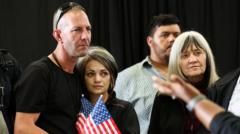The arrival of 59 white South African refugees in the US, facilitated by the Trump administration, has raised eyebrows as it contrasts sharply with the halt on other refugee admissions. Critics argue that this preferential treatment is politically motivated and racially charged, highlighting ongoing tensions between the US and South Africa regarding land reform and racial profiling.
Trump Administration Expedites Refugee Status for White South Africans, Stirring Controversy

Trump Administration Expedites Refugee Status for White South Africans, Stirring Controversy
A group of 59 white South Africans has arrived in the US under a refugee plan expedited by the Trump administration, igniting debates regarding racial discrimination and refugee policies.
A group of 59 white South Africans touched down at Dulles Airport near Washington DC, granted refugee status under a policy expedited by President Donald Trump. The administration has characterized the Afrikaner minority as victims of "racial discrimination" in their homeland. In contrast, the South African government maintains that there is no persecution warranting such refugee designation.
Human Rights Watch criticized the move as racially biased, emphasizing that many black and Afghan refugees have been denied similar opportunities. Upon arrival, the newcomers were greeted warmly by US officials, with joyful scenes including parents waving American flags. Typically, US refugee processes take months or even years, yet this group was fast-tracked without the usual vetting by the UNHCR.
When questioned about the accelerated applications for the Afrikaners, Trump cited a "genocide" against white farmers in South Africa. However, South African President Cyril Ramaphosa dismissed such claims, asserting that they do not fit the legal definition of refugees escaping political, religious, or economic persecution.
Adding further complexity, Ramaphosa revealed in a phone call that the US description of conditions in South Africa was misleading. US criticisms have focused on South African land reform policies, particularly a new law allowing the government to seize land from white owners without compensation, while asserting that no land has yet been appropriated under this legislation.
The controversial issue escalated with South African-born Elon Musk's assertions regarding a "genocide of white people" in South Africa, a claim that has been widely discredited by various organizations. Democratic lawmakers have condemned the initiative as racially charged and politically motivated, claiming it serves as a “dog whistle” for specific voter bases in the US.
The Episcopal Church has distanced itself from the refugee settlement process, protesting the preferential treatment afforded to the Afrikaners. Legal challenges against the Trump administration’s refugee admissions policies are ongoing, highlighting the broader implications for thousands of refugees currently stuck in limbo.
South African author Max du Preez criticized the notion of systemic persecution, citing negligible statistics of farm-related murders in 2024, and stressing that claims of targeted attacks based on race are unfounded.
Strained relations between the US and South Africa have worsened since Trump initiated efforts to resettle Afrikaners, culminating in diplomatic expulsions over racially charged accusations from both sides. This situation unfolds against a backdrop of the US government's more stringent immigration policies, complicating the landscape for potential asylum seekers.






















